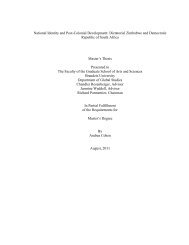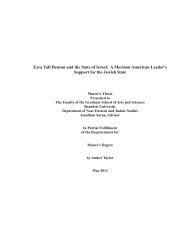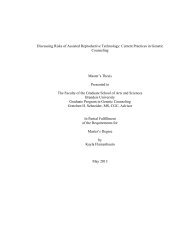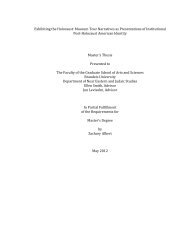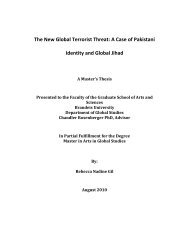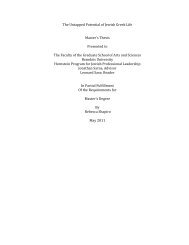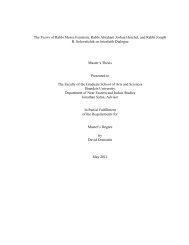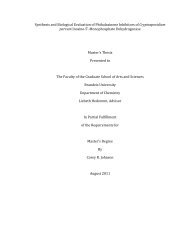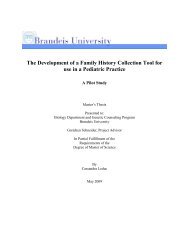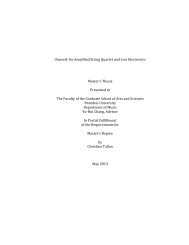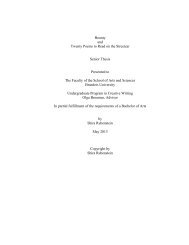A Familiar Frontier: The Kennedy Administration in the Congo ...
A Familiar Frontier: The Kennedy Administration in the Congo ...
A Familiar Frontier: The Kennedy Administration in the Congo ...
Create successful ePaper yourself
Turn your PDF publications into a flip-book with our unique Google optimized e-Paper software.
<strong>the</strong> crisis that Eisenhower faced, even near <strong>the</strong> end of his term. This <strong>the</strong>sis will exam<strong>in</strong>e<strong>the</strong> events of 1960 and 1961, a period which <strong>in</strong>cludes events of enormous significance<strong>in</strong>clud<strong>in</strong>g <strong>the</strong> secession of Katanga, Lumumba’s dismissal by President Kasavubu, <strong>the</strong>rise of <strong>the</strong> ambitious young Colonel Joseph Mobutu, Lumumba’s kidnapp<strong>in</strong>g and secretassass<strong>in</strong>ation, <strong>the</strong> death of U.N. Secretary-General Dag Hammarskjold and <strong>the</strong> U.N.’sarmed <strong>in</strong>tervention <strong>in</strong> Katanga.This <strong>the</strong>sis could easily have extended through Mobutu’s decisive coup d’état <strong>in</strong>1965, and thus <strong>the</strong> Presidency of Lyndon B. Johnson, but events played out differentlyafter 1961. It would be more difficult to establish a narrative of American <strong>in</strong>volvement,because, <strong>in</strong> <strong>the</strong> m<strong>in</strong>ds of many <strong>in</strong> <strong>the</strong> West, <strong>the</strong> <strong>Congo</strong> Crisis was substantially resolvedby <strong>the</strong> end of 1961. <strong>The</strong> U.S. and <strong>the</strong> U.N. were los<strong>in</strong>g <strong>in</strong>terest <strong>in</strong> <strong>the</strong> day-to-day events <strong>in</strong><strong>the</strong> country, and would play only a sporadic role over <strong>the</strong> next few years. <strong>The</strong> death ofHammarskjold <strong>in</strong> September 1961 deprived <strong>the</strong> <strong>Congo</strong> of one of its ma<strong>in</strong> advocates on<strong>the</strong> <strong>in</strong>ternational stage, and his successor U Thant never developed a comparable personalstake <strong>in</strong> <strong>the</strong> crisis. Yet <strong>the</strong> trend was already established by <strong>the</strong> end of 1961, and <strong>the</strong>rewere more than enough critical moments <strong>in</strong> <strong>the</strong> eighteen preced<strong>in</strong>g months <strong>in</strong> which tof<strong>in</strong>d cont<strong>in</strong>uity. <strong>The</strong> task of this <strong>the</strong>sis is to show that such a trend existed <strong>in</strong> that period,draw<strong>in</strong>g <strong>the</strong> policies of Eisenhower and <strong>Kennedy</strong> <strong>in</strong>to a s<strong>in</strong>gle, unified account, despitewhat <strong>the</strong> historical actors <strong>the</strong>mselves have said.John F. <strong>Kennedy</strong> came to office with <strong>the</strong> promise of a New <strong>Frontier</strong> for <strong>the</strong> UnitedStates, a far-reach<strong>in</strong>g policy <strong>in</strong>itiative that emerged out of <strong>Kennedy</strong>’s speech at <strong>the</strong>Democratic National Convention <strong>in</strong> August 1960. Although <strong>the</strong> New <strong>Frontier</strong> issometimes thought of as a set of domestic goals, its very name makes it clear that4





